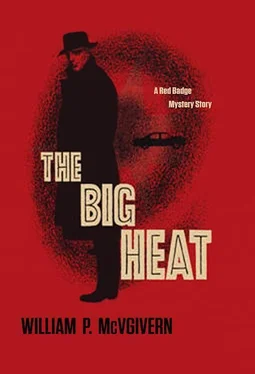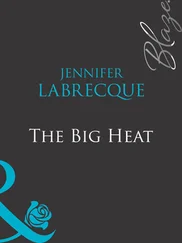“This was all in nineteen forty-one?” Bannion said.
She nodded. “That was the start of it and the end of it. I knew I was on a one-way street. I wanted Tom, don’t think I didn’t, but I couldn’t have him without hurting him, and I didn’t want to do that. So I bowed out, and that was that.”
“And you’ve survived,” Bannion said, with a smile. “Now, let’s get to the point. What makes you think this story about his health isn’t on the level?”
Lucy met his eyes. “I talked to him last week, had dinner with him, as a matter of fact. It was the first time I’d seen him since Atlantic City. We just bumped into each other on Market Street about five in the evening. His wife had gone to Harrisburg to visit her sister, he said, and he asked me to have a drink with him. It drifted into dinner. He was in a wonderful mood, happy and gay. I’d never seen him that way before. He told me he’d never felt better in his life.”
“Was he referring specifically to his health when he said that?”
“Well, I’m not sure,” Lucy said. “No, he couldn’t have been, because we didn’t talk about his health. There was no reason to. He looked fine, and he said he felt wonderful.”
“The phrase is a fairly general one,” Bannion said. “People use it to express a state of mind, satisfaction with work, things like that.”
“But that’s not the only reason I think something is — well, funny,” Lucy said. “Tom just wouldn’t kill himself. Not the way he was feeling.”
Bannion paused, and then shrugged. “Lucy, the fact is Tom did shoot himself. That’s definite.”
She shook her head slowly, but some of the conviction, the assurance had left her face. “It just doesn’t seem right.”
“Tell me this,” Bannion said. “Did he seem worried about anything else. Did he say anything about finances, about the wife, something like that.”
“No, he didn’t, and that’s funny, too,” she said, in a slightly surprised voice. “I told you how worried he always was, how he was always stewing about things. Like he was to blame for things being in a mess. He felt responsible for everything, it seemed. You’d think he felt guilty about not being able to take care of all the trouble in the world.” She watched Bannion, excited and eager. “But last week he was a different person. He was really happy. He felt good. Like he’d just done something to ease his conscience, make him stop feeling guilty. I could tell. That’s why I know he wouldn’t shoot himself.”
“Still, Lucy, he did.” He frowned slightly and lit another cigarette. “Perhaps this change you saw in him, this happiness, was a result of his coming to terms with the world, and seeing it for what it is, neither heaven nor hell in itself, but a place you live in and make the best of.”
“Well, if that’s what happened to him, why did he shoot himself?” Lucy said.
“I don’t know, Lucy,” Bannion said. “However, and I’m frankly-guessing now, he might never have got rid of that feeling of guilt and responsibility. Underneath, it worked away on him until he thought the only way to destroy it was by destroying himself. Maybe Tom never changed; maybe he was just as upset and insecure last week as he was when you met him the first time.”
“I don’t think you’re guessing right,” Lucy said, uncertainly. “I don’t know why, I can’t put it in words, but Tom was happy, really happy, last week. It wasn’t just an act. I know it wasn’t.”
Bannion shrugged. “And I know that he shot himself.”
“I’ve wasted your time, haven’t I?”
“No, of course not.”
She rubbed her forehead. “You’ve been really nice about it. I’m sorry about dragging you out this way.”
“Forget it. That’s what cops are for. If there’s anything strange about a suicide we want to know about it. Now, how about having a drink with me?”
She shrugged and smiled. “Okay, Mr. Bannion.”
Fifteen minutes later Bannion was on his way home. The curving river drive was silent and deserted. He drove at a steady fifty-five. An hour wasted on a wild-goose chase, he was thinking, but not with rancor. And then the habits of years caused him to amend the sentence. Probably wasted, he decided, and snapped on the radio.
The next afternoon Bannion spent an hour on desk-work, checking the progress of the three cases which were currently being handled by his shift. Two of them were going to the Grand Jury in the morning and were strong enough for that test; the third was back from the Grand Jury with a True Bill but the D. A. wanted it strengthened, if possible, before it went to court. Bannion gave Carmody and Katz the D. A.’s memo, and told them to get working at it. Burke’s Negro was looking better all the time. His alibi — he’d been in a poker game with friends — had got an unexpected boost from the beat cop who had stopped by to tell them to cut down the noise. The Negro’s friends would fade away, Bannion knew, afraid of getting involved themselves, but a cop for the defense meant practically an automatic acquittal. The D. A. would scream if they tossed this one at him, Bannion thought with a smile. Also the man’s record looked good. He was employed as a body-and-fender man around town, had never been in any trouble with the police, and his family were respectable people.
Burke came over and sat on the edge of Bannion’s desk. He was grinning. “Up in the air like smoke,” he said, nodding at the report on the Negro.
“This is good work,” Bannion said.
“I felt industrious last night, so I looked into it,” Burke said. “My own time, too.”
“I’ll bet,” Bannion said.
“We’ve got the wrong guy, I guess,” Burke said.
“Well, we can let the right one go, which is something,” Bannion said. He glanced at his watch. “I’m going to take a ride. I’ll be back around five or six.”
“Everything okay with Deery?” Burke said, as Bannion got into his coat.
Bannion hesitated, then said: “Yes, he shot himself, if that’s what you mean. Did you know him pretty well?”
“Fairly well.”
“Did you know that he had a home in Atlantic City before the war?”
“Yes, I had a drink with him there once. Met him on the boardwalk, and he asked me to stop by later for cocktails.”
“What kind of a place was it?”
“Pretty nice. A high-class sweep-out, you might call it.”
They walked toward the door, their voices and expression casual. “How did that figure on a police clerk’s salary?” Bannion said.
Burke shrugged. “Prices were lower those days.”
“And so were salaries,” Bannion said.
“Well, maybe he had some outside work. Keeping books for a small firm, clerking nights, something like that.” Burke stopped at the counter and put an elbow on it. “Maybe he was lucky at cards,” he said.
“Yeah, sure,” Bannion said.
“I always heard he was okay,” Burke said.
“So did I. Well, I’ll see you later.”
“Right, Sarge.”
Bannion went to his car and drove out toward Tom Deery’s home, crossing the Delaware River at Spruce Street and heading out to West Philadelphia. The afternoon was cold and dry, and darkened here by smoke drifting from the locomotives at Thirtieth Street station. Bannion had thought quite a bit about Lucy Carroway’s story. It didn’t add up to very much, but it had to be checked. That was the essence of police work; checking everything. A cop had to investigate all the obvious details, ask all the obvious questions, plod about doing things that frequently seemed pointless and stupid. The man-in-the-street and the editorial writers on the papers could tell him a quicker way to do it, of course. They knew that such-and-such an angle was impossible, unlikely or foolish. They didn’t have to check it; they just knew. But a cop couldn’t afford these seemingly logical short-cuts. He had to do all the tedious, useless work, because occasionally the impossible, unlikely or foolish areas of investigation turned out to be the most profitable ones.
Читать дальше

![Уильям Макгиверн - Завтра опять неизвестность [английский и русский параллельные тексты]](/books/35168/uilyam-makgivern-zavtra-opyat-neizvestnost-angli-thumb.webp)









